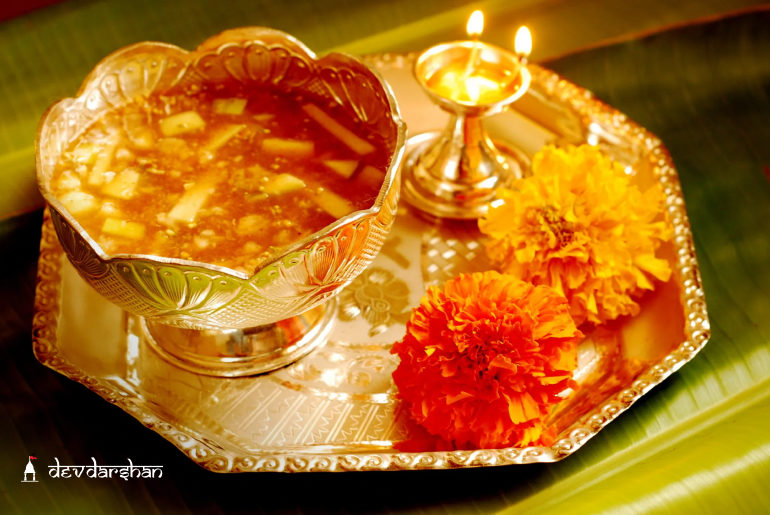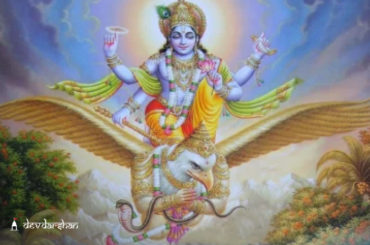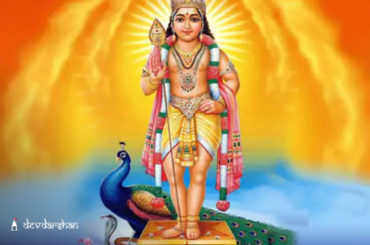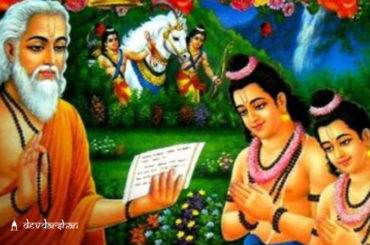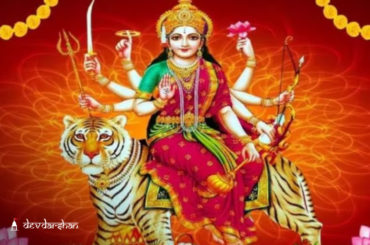Ugadi, also known as Yugadi, is a popular festival celebrated in the Indian states of Karnataka, Telangana, and Andhra Pradesh, as well as by the Kannadiga and Telugu communities worldwide. The word Ugadi is derived from the Sanskrit words ‘yuga’ and ‘adi’, which means ‘beginning of a new age’. It marks the beginning of a new year in the Hindu lunar calendar.
Ugadi is celebrated as Gudi Padwa by the people of Maharashtra. Both Ugadi and Gudi Padwa are celebrated on the same day. In North India, people do not celebrate Ugadi but start nine days of Chaitra Navratri Puja on the same day and also eat Neem with Mishri on the very first day of Navratri. Some Devotees also observe fast for the nine days of Chaitra Navratri.
On this day, people wake up early, take a bath, and wear new clothes. They decorate their houses with mango leaves and colourful rangolis. Special prayers are offered to the deities and Devotees seek blessings for a happy and prosperous year ahead. Traditional Ugadi dishes are prepared and exchanged among family and friends. The festival is also marked by cultural events, fairs and other festivities.
Also Read: Gudi Padwa – The Festival of Victory
So, let’s get to know more about the Date, Rituals and Significance of Ugadi 2023.
Ugadi 2023: Date, Muhurat and Timings
This year, Ugadi will be observed on Wednesday, March 22, 2023
- Pratipada Tithi Starts: 10:52 p.m on March 21, 2023
- Pratipada Tithi Ends: 08:20 p.m on March 22, 2023
Find Out Date and Muhurat of Chaitra Navratri 2023
Significance of Ugadi
Ugadi holds greater significance for the people of South India. Ugadi also holds greater significance with regard to the seasonal aspect religious aspect. Let’s find out more in detail.
New Beginnings
Ugadi marks the beginning of a new year in the Hindu lunar calendar. It is believed that Lord Brahma, the creator of the universe, started the creation of the world on this day. Thus, Ugadi is considered an auspicious time for new beginnings, be it starting a new business or beginning a new phase of life.
Seasonal Change
Ugadi falls in the month of Chaitra, which usually marks the end of winter and the beginning of spring. The festival celebrates the changing seasons and the bounty of nature. The new year is welcomed with hope and optimism for a good harvest and a prosperous year ahead.
Religious Significance
Ugadi has religious significance for Hindus. It is believed that Lord Brahma created the universe on this day, and Lord Vishnu took his first incarnation as Matsya (fish) on this day to save the world from destruction. It is also believed that Lord Rama returned to Ayodhya after defeating Ravana on this day.
Community Spirit
Ugadi is a time for family and community gatherings. People exchange greetings, gifts and traditional foods with their friends and loved ones. It strengthens social ties and fosters a sense of unity and togetherness.
Overall, Ugadi is a time of joy, hope and new beginnings as well as it holds great significance for the Hindu community.
Also Read: The Significance of Gudi Padwa
Ugadi 2023 Festival Rituals
In the Deccan region of India, Ugadi is a time of merrymaking, colours and enjoyment. Devotees start preparing for the festival of Ugadi almost a week in advance. Houses are cleaned and painted and then decorated with rangolis and fresh flowers. Cow dung water is used to purify the ambience. Mango leaves are tied at the doorstep as a symbol of prosperity and good fortune.
- On a festive day, wake up early at dawn. Take bath and wear clean clothes.
- Worship Lord Vishnu following the traditional rituals, offer prayers and seek blessings for success and happiness in the coming year.
- On this occasion, people also buy new clothes and jewellery.
- This season is the time for raw mangoes. Thus, dishes made of raw mangoes like ‘pulihora and ‘bobbatlu’ are prepared during Ugadi.
- A traditional dish called ‘Ugadi pachchadi’ is also prepared on this day which contains jaggery, green pepper, salt, neem flowers, tamarind and raw mango pieces which is symbolic of all the flavours of ‘life’.
- Ugadi is also a period of cultural activities. People gather together for devotional songs, hymns and poetry recitals (kavi sammelan) to observe this festival.
- Also, the practice of ‘Panchanga Shravanam’ is carried out where people gather together to listen to the Panchanga or the forecast of the New Year.
- This festival is also a time of family unions. Families gather together to prepare a feast and enjoy this day.
- As goodwill of the new year, a special mixture made of neem leaves and jaggery is distributed among everyone.
- Seeking the blessing of the elders of the family is a must on this day according to the ancient Indian tradition.
Legends Behind Ugadi
According to a legend associated with the festival of Ugadi, it is believed that Lord Brahma started the creation of this universe on this day. Thereafter, in order to keep the track of time, he went in creating minutes, hours, days, weeks and years. Hence, Ugadi marks the day of the creation of this universe.
Also, according to Hindu scriptures, Lord Vishnu is also known as Yugaakrit which means the creator of Yugas or ages. Therefore, on this day of Ugadi, Devotees also worship Lord Vishnu and seek his blessings for a happy and prosperous life.
It is said that Ugadi is also the day when Lord Krishna left his human body and departed from this earth. Moreover, it is well-known fact that Lord Rama returned to Ayodhya on Diwali after defeating King Ravana. And, on the day of Ugadi, he was crowned as the King of the Ayodhya Kingdom. His Rajyaabhishek was performed on the Ugadi day with great celebrations. Hence, this day is considered to be very auspicious and people start new ventures on this day.
Ugadi – Different Names in Different Regions of India
This festival day is celebrated as the beginning of a new year in different parts of the country India. Celebrated on the same day, Ugadi is known by different names in the various regions of the sub-continent of India.
- Navreh in Kashmir
- Thapna in Rajasthan
- Gudi Padwa in Maharashtra
- Samvatsar Padvo among Konkanis in Goa and Kerala
- Konkanis in Karnataka know it as Yugadi
- Sajubu Nongma Padwa in Manipur
- Chheti Chand among Sindhis
- Puthandu in Tamil Nadu
- Baisakhi in Punjab
- Chaitra Navratri begins from this day for North Indians
Check out various Online Puja and services provided by DevDarshan here and get your bookings done in one click. If you want to know more about Indian culture, Indian Temples, Pujas and festivals, then download the DevDarshan App. Don’t forget to share this blog if you liked.

